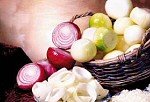History of French Cooking
By Michele Robbins
When it comes to French cooking, some of the most distinguished and elegant culinary styles are associated with this type of food preparation. The style of cooking responsible for the recipe of the red wine-cooked beef dish, Bouef Bourguignon and many versatile quiche creations, has evolved over many centuries including a past driven by an assortment of social and political transformations. French cooking has a history built upon banquet halls filled with heavily seasoned food of the Middle Ages to the haute cooking ("high cooking") of the French, which treated cookery as an art form.
The evolution of French cooking has seen many different changes, where French Medieval cuisine involved great preparation and presentation. Sauces at this time were thick and full of seasonings. Flavorful mustards accompanied sliced meats. During the late 18th to 19th century, foundation sauces became an important part of French cooking and were often made in large quantities. The late 19th to early 20th century followed a "brigade system" of cookery, as professional kitchens assigned cooks to one of five separate stations (cold dishes; sauces; pastries; roasted, grilled or fried foods; and soups and vegetables).
The intense diversity and cooking style of the French is seen through the traditional ways of France, where each region possessed their own unique cuisine that both the upper class and peasants accepted. Various parts of France became quite popular alone on the types of food and drink they held as specialties. Today, impressive fruit preserves come from Lorraine, while ham is delicious in Champagne. Normandy is home to the savory "moules a la crème Normande" (mussels cooked with white wine, garlic and cream).
The coastline of France opens up to an exciting world of seafood dishes, including sea bass, herring, scallops, and sole. Brittany recipes for lobster, crayfish, and mussels are well received. In Normandy, cider becomes an important ingredient because of their large population in apple trees. In the North, thick stews decorate the dinner table, as well as some of the best cauliflower and artichoke side dishes.
Creative salads are also popular in France, as "Salade Aveyronaise" is prepared with lettuce, tomato, Roquefort cheese, and walnuts in Aveyron. Cote d' Azur is known for the "Salade Niçoise," which offers a variety of ingredients, but always includes black olives and tuna. Additional regional meals include hochepot, a stew consisting of four different meats, and matelote, which offers a fish dish stewed in cider.
At some point in time, almost every French cook will prepare a crepe, a pancake cooked very thin and generally made from wheat flour. While a crepe may include eggs, cheese, spinach, and other ingredients as fillings, the most popular version is considered the dessert or sweet approach that often showcases melt-in-your-mouth whipped cream and strawberry sauce. The fillings and toppings for a crepe are never-ending, as cinnamon, nuts, berries, bananas, ice cream, chocolate sauce, maple syrup, jams and jellies, powdered sugar, and soft fruits allow French cooking creativity to blossom. Other worthy French desserts include chocolate mousse, tarts, choux a la crème, and many delightful pastry options.
Today, French cooking is known to make use of a variety of locally grown vegetables in their recipes. Carrots, potatoes, French green beans, leeks, eggplant, truffles, shallots, turnips, and many different kinds of mushrooms, such as porcini and oyster, are common selections. Meat dishes often center on chicken, duck, squab, veal, pork, rabbit, quail, and lamb. Savory egg recipes include exquisite omelets, sometimes seasoned with regional spices and herbs, including marjoram, lavender, fennel, sage, and tarragon.
For more information about French Cooking, please visit us at http://www.yourcookingnow.com/french/
Article Source: http://EzineArticles.com/?expert=Michele_Robbins
http://EzineArticles.com/?History-of-French-Cooking&id=629975

 My StumbleUpon Page
My StumbleUpon Page
No comments:
Post a Comment